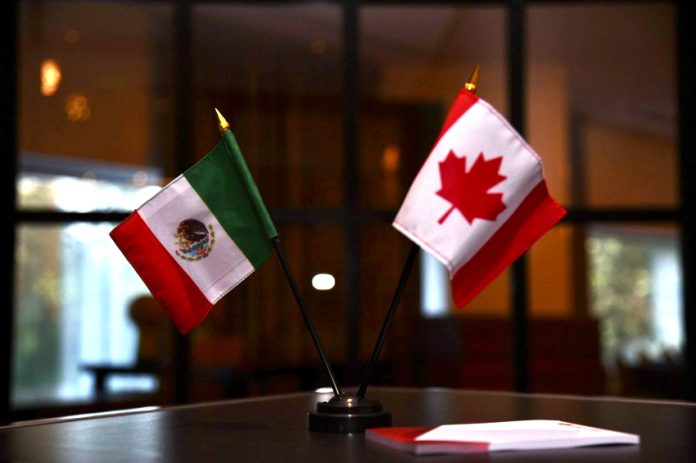On a late January day in 1944 – the same day that a British bomber sank a German U-boat in the Bay of Biscay as World War II continued to rage – Mexico and Canada established diplomatic relations.
Now, in 2024, the two countries are celebrating the 80th anniversary of that milestone with a range of events, including a photographic exhibition inaugurated by Canadian Foreign Minister Mélanie Joly during her visit to Mexico City in late June.

This week, Mexico News Daily is joining the celebrations with a series of “Canada in Focus” articles, each of which explores connections between Mexico and Canada.
As we’ve done in previous editions of our Global Mexico series, we’re kicking things off by delving into the history of Mexico-Canada relations, and examining the state of the bilateral relationship today.
A brief history of Mexico-Canada relations
While the formal diplomatic relationship between Mexico and Canada began 80 years ago, their commercial relationship dates back even further.
Products made in the country now known as Canada were exported to Mexico even before the British North American colonies of Nova Scotia, New Brunswick and the Province of Canada came together in 1867 to form the Dominion of Canada.
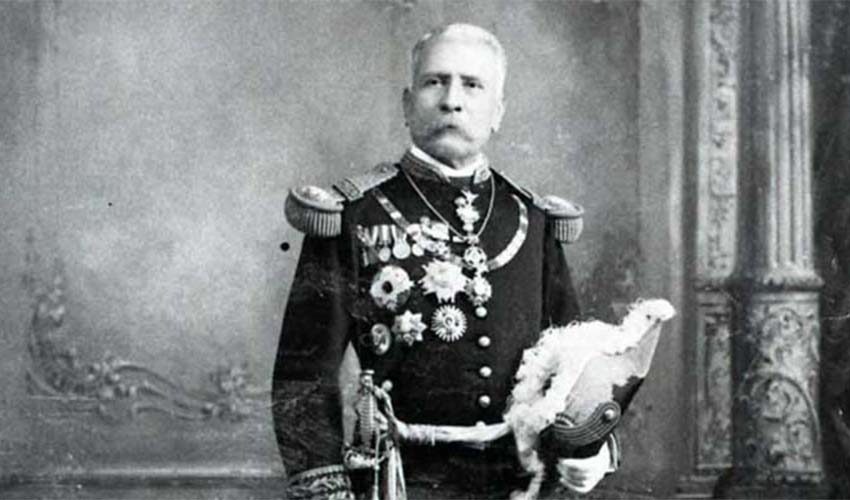
During the Porfiriato — the three-decade period in the late 19th century and early 20th century when Porfirio Diáz was president of Mexico — Canadian investment began flowing into the country.
“At that time, Canada played a significant role in Mexico through major infrastructure projects including railways, urban transportation, hydro-electrification, water treatment and the establishment of the banking system,” Sandra Fuentes, a former Mexican ambassador to Canada, wrote in an article published in the magazine Voices of Mexico.
Companies such as Mexican Light and Power Company, Mexico Tramways Company and Mexico North Western Railway were founded with Canadian money around this time.
Díaz was ousted at the start of the Mexican Revolution, and the decade-long conflict that ensued was a major impediment to Canadian investment in Mexico.
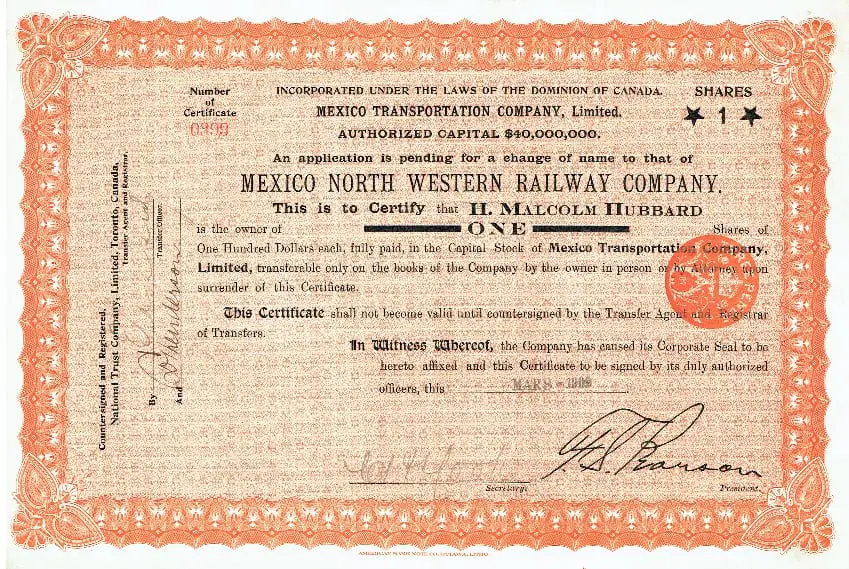
In 1938, almost two decades after the end of the Mexican Revolution, President Lázaro Cárdenas nationalized Mexico’s oil industry and expropriated the assets of foreign petroleum companies. Canada cited that decision as a reason for holding off on establishing diplomatic relations with Mexico at a time when it was formalizing ties with other Latin American countries, such as Argentina and Brazil.
Eventually, amid World War II, a conflict in which both Mexico and Canada participated on the Allied side, formal diplomatic relations were established.
Fuentes, the former Mexican ambassador, wrote that “one would have thought that there would have been a flurry of activity between the two countries” after the commencement of diplomatic relations.
“But this was not so,” she said. “In fact, over the next 30 years, while the two countries often shared similar views on major issues of the times, … bilateral interaction was very limited.”
Despite that, it was in this period that a Mexican president and a Canadian prime minister came face to face for the first time. Adolfo Ruiz Cortines met Louis St. Laurent at a trilateral meeting in 1956 organized by United States president Dwight D. Eisenhower.
At that meeting, held in White Sulphur Springs, West Virginia, the Mexican and Canadian leaders raised with Eisenhower “similar concerns related to their proximity to their powerful neighbor, such as environmental issues, illegal fishing by American vessels and the temporary employment of Mexican workers,” wrote Fuentes, citing Ruiz’s 1956 report to the nation.
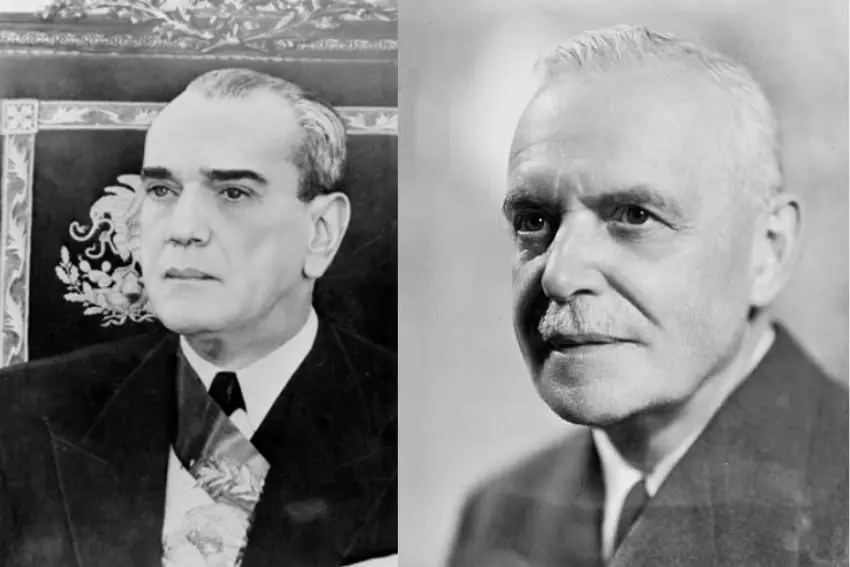
In 1959, Adolfo López Mateos became the first Mexican president to make an official visit to Canada. Canadian prime minister John Diefenbaker reciprocated by coming to Mexico the following year.
Many other Mexican and Canadian heads of state subsequently met during visits to each other’s countries.
In 1968 — an especially tragic year in Mexico due to the Tlatelolco massacre just before the start of the Mexico City Olympics — a joint Mexico-Canada ministerial committee was established, providing a forum for biennial meetings between officials from the two countries.
A significant development in the bilateral relationship occurred in 1974 when the governments of Mexico and Canada signed a memorandum of understanding that established the Mexico-Canada Seasonal Agricultural Worker Program (SAWP).
Just over 200 Mexican workers went to Canada in the program’s inaugural year, while more than 26,000 will participate during this 50th anniversary year, according to the Mexican government.
“Over the last five decades, 522,628 employment contracts have been arranged, benefiting an equal number of families,” the government said in a recent statement.
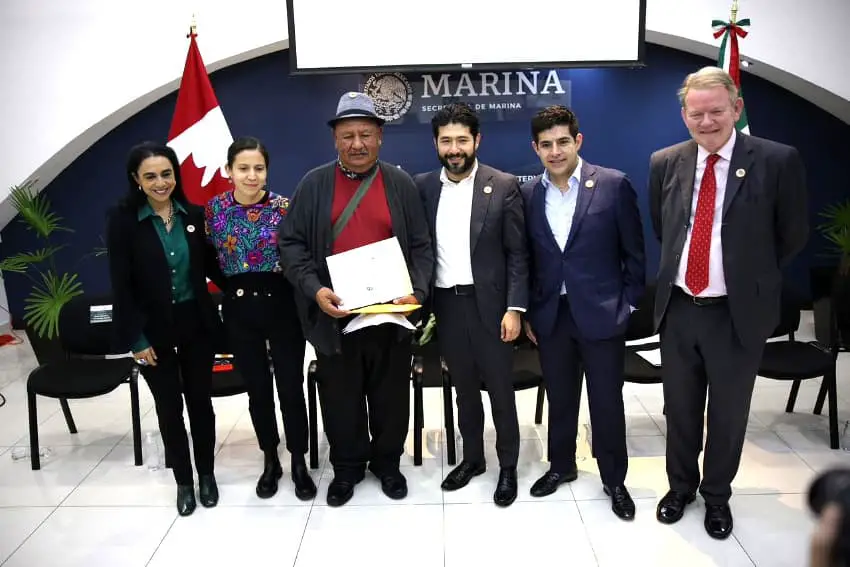
Mexico and Canada entered into a range of other agreements facilitating cooperation in various fields in the years and decades after the SAWP was established. They include a cultural agreement, signed in 1976, and an environmental cooperation agreement, reached in 1990.
The relationship, however, was turbocharged when the two countries, together with the United States, signed the North American Free Trade Agreement, or NAFTA, which took effect on Jan. 1, 1994.
Trade between Mexico, Canada and the United States is now governed by the USMCA, which superseded NAFTA in 2020. The free trade pact is known as T-MEC in Mexico and CUSMA in Canada.
The bilateral relationship in the NAFTA and USMCA era
Trade
The trade relationship between Mexico and Canada has increased significantly in the 30 years since NAFTA took effect.
Two-way trade was worth US $49.7 billion in 2022, up from about $4 billion in 1993.
Canada is the second largest destination for Mexican exports, after the United States.
According to the Canadian government, Mexico is Canada’s third largest single-country trading partner after the U.S. and China, while Canada is Mexico’s fourth-largest trading partner.
Major Mexican exports to Canada include motor vehicles, auto parts, alcoholic beverages and agricultural products such as fruit. Among Canada’s exports to Mexico are auto parts, aluminum, steel, wheat and rapeseed.
Investment
Canada was the third largest foreign direct investor in Mexico last year after the United States and Spain.
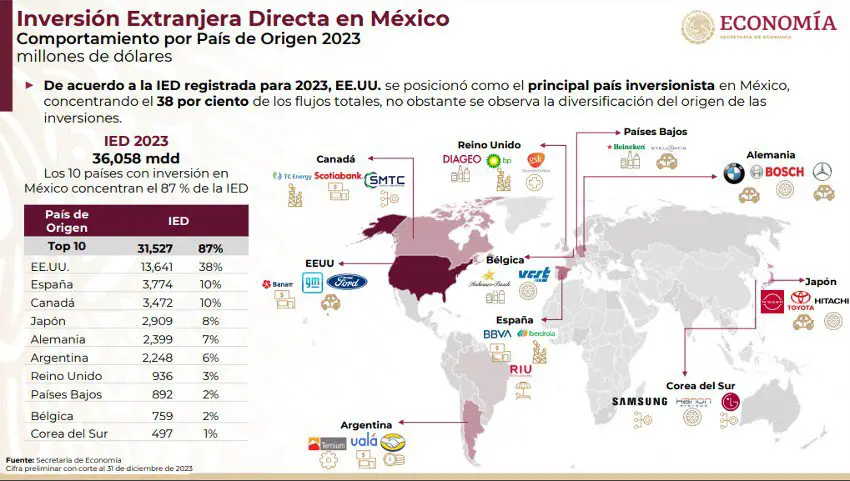
Economy Ministry data shows that Canadian investment totaled $3.47 billion last year, or almost 10% of Mexico’s FDI.
Among the major Canadian companies that operate in Mexico are Scotiabank, TC Energy and Bombardier.
A number of large Canadian mining companies also have a presence in Mexico. Some have faced criticism for reasons that include alleged damage of the environment, such as water contamination, and failure to pay taxes.
For its part, the Canadian government says that “Canadian investors play an important role in economic development and employment in Mexico, sometimes in isolated and marginalized regions.”
“Canadian companies are committed to operate under the principles of responsible business conduct, and contribute through their programs not only to employment, but also to education, sustainable development and the well-being of individuals and communities,” it adds.
Canadian businesses in Mexico are represented by the Canadian Chamber of Commerce in Mexico.
Among the Mexican companies that operate in Canada are baked goods company Grupo Bimbo, which owns Bimbo Canada, building materials company Cemex and mining company Grupo México.
The Canada-Mexico Partnership and the Canada-Mexico Action Plan
Launched in 2004, the Canada-Mexico Partnership is the “key mechanism for bilateral cooperation” between the two countries, according to the Canadian government.
“It serves as a catalyst for concerted action between our governments, private sectors, and non-governmental partners to pursue common goals and mutually beneficial priorities,” the Canadian government says.
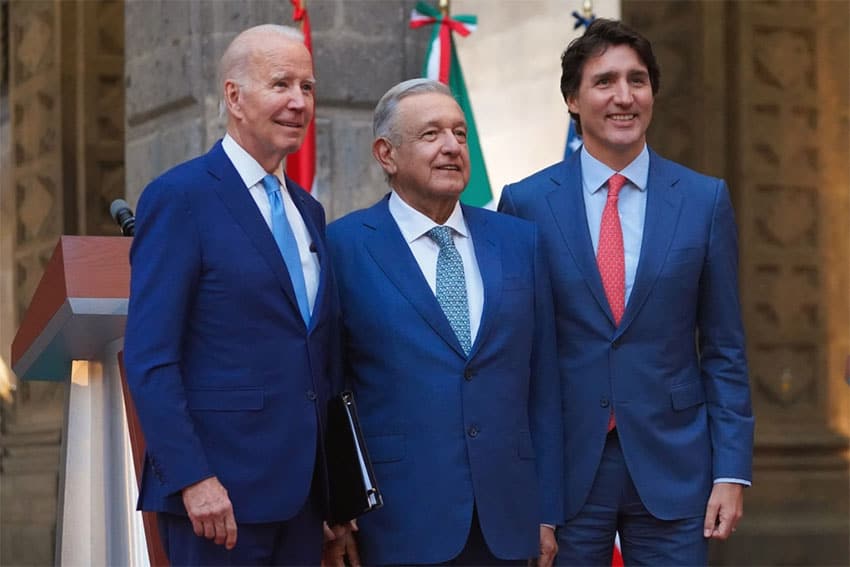
Mexican and Canadian officials frequently engage at bilateral, trilateral and multilateral meetings.
After the trilateral North American Leaders’ Summit in Mexico City in January 2023, President Andrés Manuel López Obrador and Prime Minister Justin Trudeau held a bilateral meeting and subsequently announced a new “Canada-Mexico Action Plan.”
The plan established “a strengthened partnership built on 9 pillars that outlines our citizens’ priorities and the initiatives that will advance them,” according to the Mexican and Canadian governments.
Those pillars are:
- Reconciliation with Indigenous Peoples
- Gender equality and women’s empowerment
- Trade and investment
- Anti-racism
- Youth engagement
- Peace and security
- Tourism, migration and human mobility
- Environment and climate change
- Cooperation in the face of future health crises
Cooperation in multilateral forums
Mexico and Canada collaborate on various issues in a range of multilateral forums including the G20, the Asia-Pacific Economic Cooperation (APEC) and the United Nations.
While the USMCA is the main instrument that governs trade between Mexico and Canada, both countries are also signatories to the Comprehensive and Progressive Agreement for Trans-Pacific Partnership, or CPTPP.
Mexico and Canada collaborated on a complaint against the United States over the interpretation of auto-sector content rules under the USMCA. They prevailed in that dispute early last year.
Challenges and disagreements in the bilateral relationship
While Mexico and Canada are trade partners and friends, there have been – and are – some challenges in the bilateral relationship arising from disagreements between the two countries.
When the Canadian government announced in February that it was ending visa-free travel to Canada for some Mexican citizens after an increase in asylum claims by Mexicans, Mexico’s Ministry of Foreign Affairs said in a statement that Mexico “regrets” the decision “and believes that there were other options available before putting this measure in place.”
Mexico and Canada remain engaged in a dispute over the former country’s nationalistic energy policies. Canada joined the United States in 2022 in seeking dispute settlement consultations with Mexico over its policies that favor state-owned firms over private and foreign companies.
President López Obrador subsequently called on both Canada and the U.S. to respect Mexico’s sovereignty.
Among the previous disputes between the two countries is one long-lasting one over potatoes.
Views of political leaders and ambassadors
The last time President Andrés Manuel López Obrador and Prime Minister Justin Trudeau met face-to-face was in San Francisco last November during the 2023 APEC summit.
At the time, López Obrador said that Mexico’s “relationship with the people of Canada is a very good one, and that the trade relationship is fundamental for the development and prosperity of the North American people and region.”
During an address in Mexico City in January 2023, Trudeau said that trade between Canada and Mexico had increased “more than ninefold” since NAFTA took effect, but asserted that there is still “huge potential for growth between our countries.”
“… Let us continue this momentum. Let us keep doing what [North American] leaders did a generation ago: hold fast to a belief in open trade and collaboration” he said.
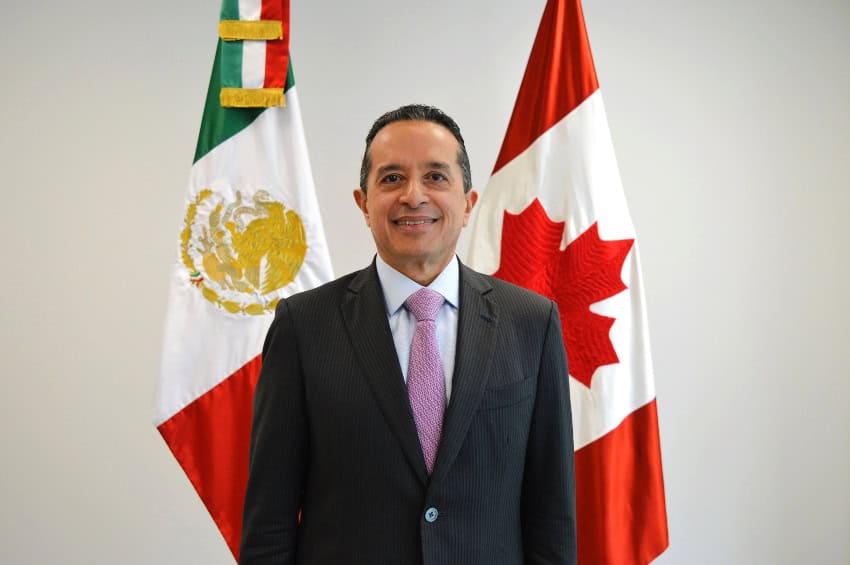
In a message included in the 2023 report “Mexico and Canada: Two Nations in a North American Partnership,” Canadian Ambassador to Mexico Graeme Clark wrote that the two countries “have become indispensable friends, partners and allies” since formal diplomatic ties were established in 1944.
“Canada and Mexico are two countries sharing not only a continent but also a solid friendship that has continued to grow over the years, and which includes strong cooperation on a wide range of issues: trade, culture, Indigenous empowerment, human rights, gender equality, and much more,” Clark wrote.
In the same report, Mexican Ambassador to Canada Carlos Joaquín described Mexico as a “strategic ally for Canada” and noted that the two countries “share various mechanisms to promote dialogue and cooperation throughout their relationship.”
“Both face the 21st century with enormous challenges, but the strength of their relationship must be the roadmap that leads to understanding in the coming years,” Joaquin wrote.
By Mexico News Daily chief staff writer Peter Davies (peter.davies@mexiconewsdaily.com)
